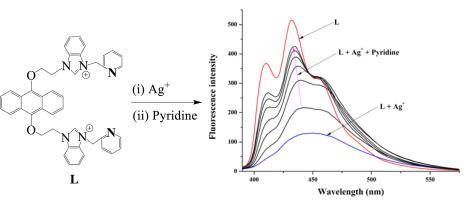荧光开关银离子和吡啶传感
IF 2.2
3区 化学
Q2 CHEMISTRY, ORGANIC
引用次数: 0
摘要
合成了一种双臂蒽,9,10-双(1′-吡啶苯并咪唑-乙氧基)六氟磷酸蒽(L)。研究了银离子和吡啶(Py)诱导下L的荧光开关。化合物L在390 ~ 550 nm处显示出较强的荧光发射。在L的溶液中加入Ag+后,由于LAg+的形成,L的荧光强度明显降低。然后,随着吡啶的逐渐加入,LAg+的荧光强度逐渐增加,直到接近L的荧光强度,形成LAg+Py。在整个过程中,在Ag+和吡啶的诱导下,L的荧光呈现出从“开”到“关”再回到“开”的变化。本文章由计算机程序翻译,如有差异,请以英文原文为准。

Fluorescence switch for silver ion and pyridine sensing
A double-arm anthracene, 9,10-bis(1′-picolylbenzimidazolium-ethoxyl)anthracene hexafluorophosphate (L), was synthesized and characterized. Fluorescence switch of L under the induction of Ag+ and pyridine (Py) was studied. Compound L displayed a strong fluorescence emission at 390–550 nm. Upon adding Ag+to the solution of L, the fluorescence intensity of L decreased remarkably due to the formation of LAg+. Then, as pyridine was gradually added, the fluorescence intensity of LAg+gradually increased until the fluorescence intensity approached that of L, where LAg+Py was formed. Throughout the entire process, the fluorescence of L showed a change from "on" to "off" and then back to "on" under the induction of Ag+ and pyridine.
求助全文
通过发布文献求助,成功后即可免费获取论文全文。
去求助
来源期刊

Tetrahedron
化学-有机化学
CiteScore
3.90
自引率
4.80%
发文量
439
审稿时长
34 days
期刊介绍:
Tetrahedron publishes full accounts of research having outstanding significance in the broad field of organic chemistry and its related disciplines, such as organic materials and bio-organic chemistry.
Regular papers in Tetrahedron are expected to represent detailed accounts of an original study having substantially greater scope and details than that found in a communication, as published in Tetrahedron Letters.
Tetrahedron also publishes thematic collections of papers as special issues and ''Reports'', commissioned in-depth reviews providing a comprehensive overview of a research area.
 求助内容:
求助内容: 应助结果提醒方式:
应助结果提醒方式:


